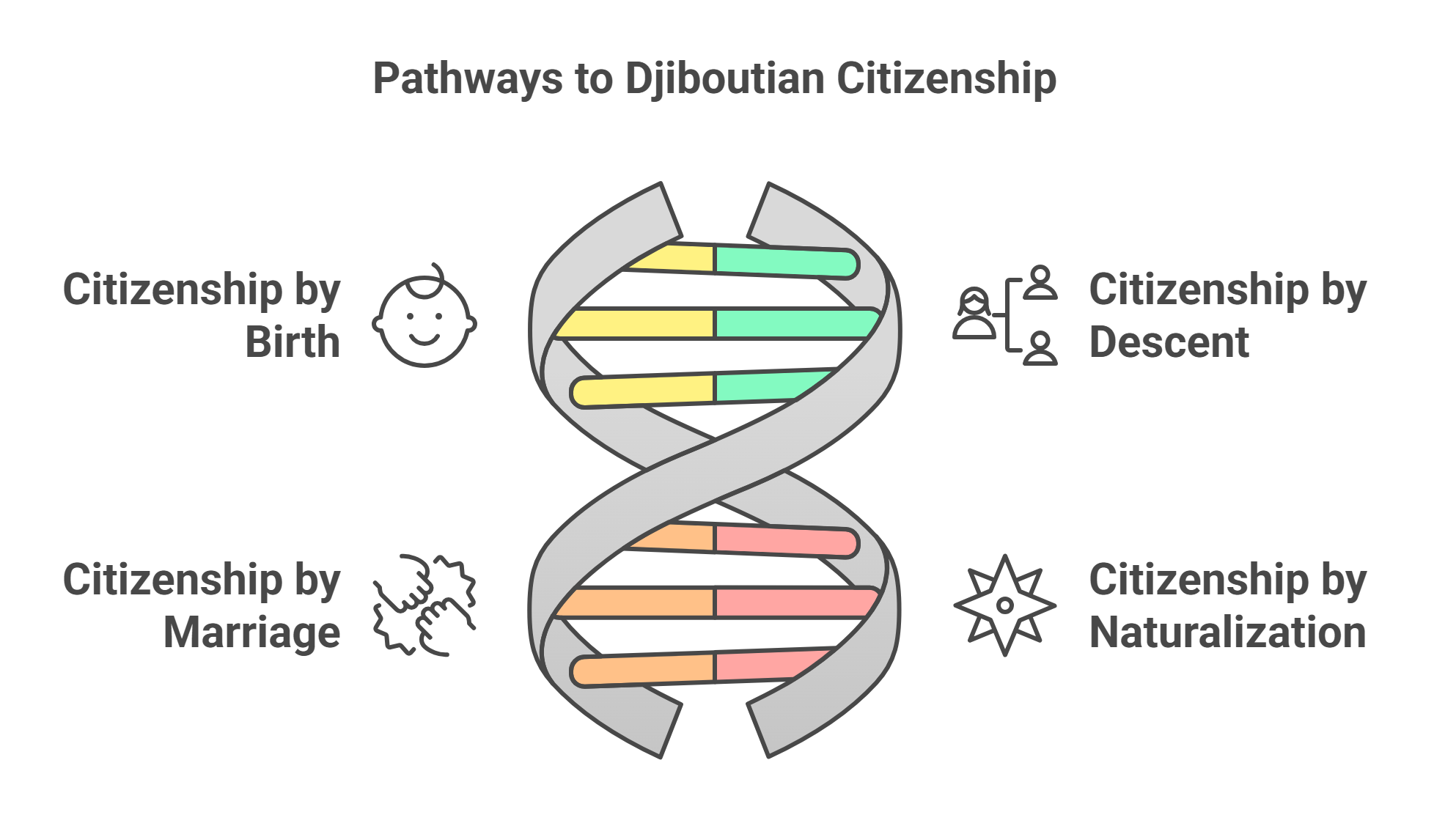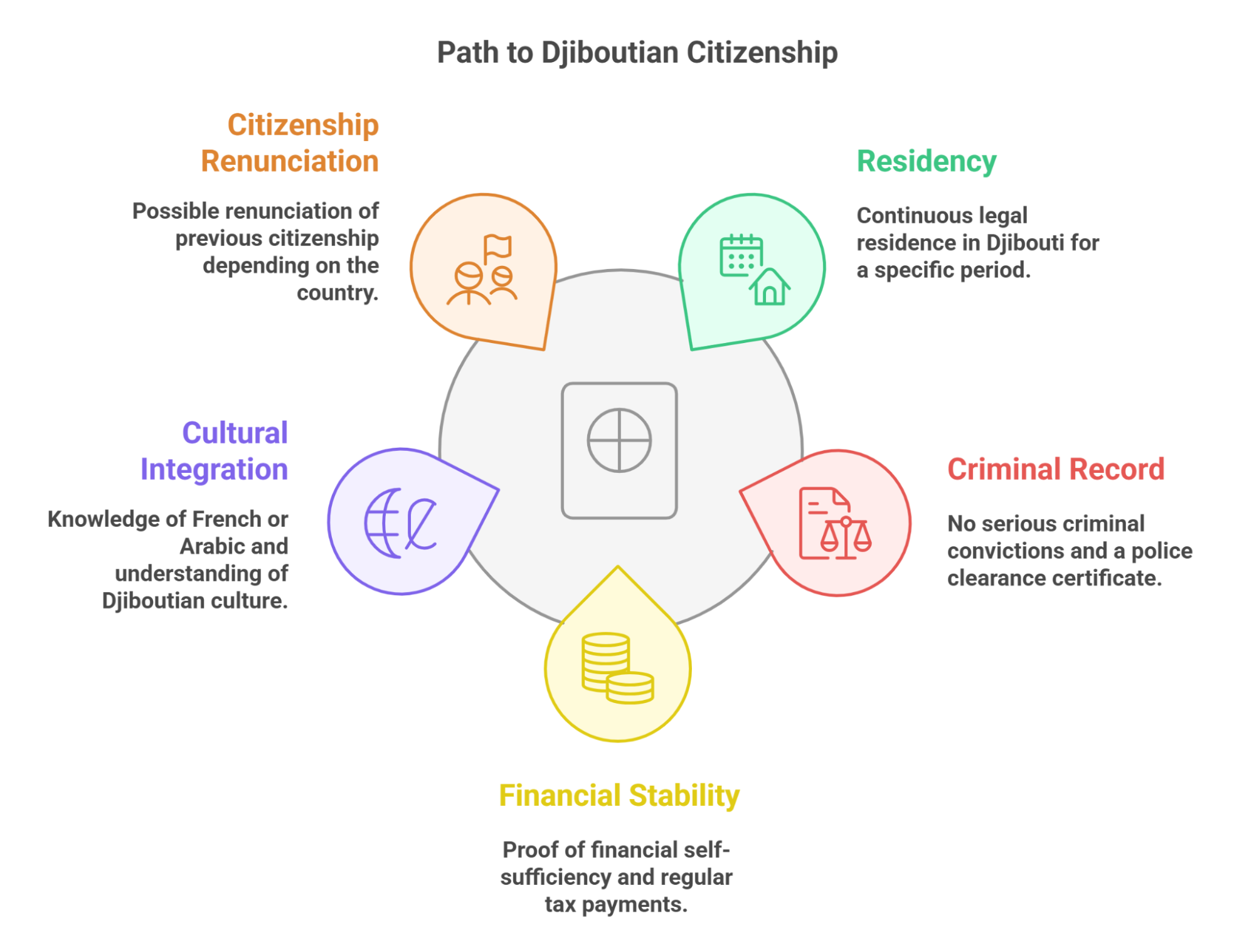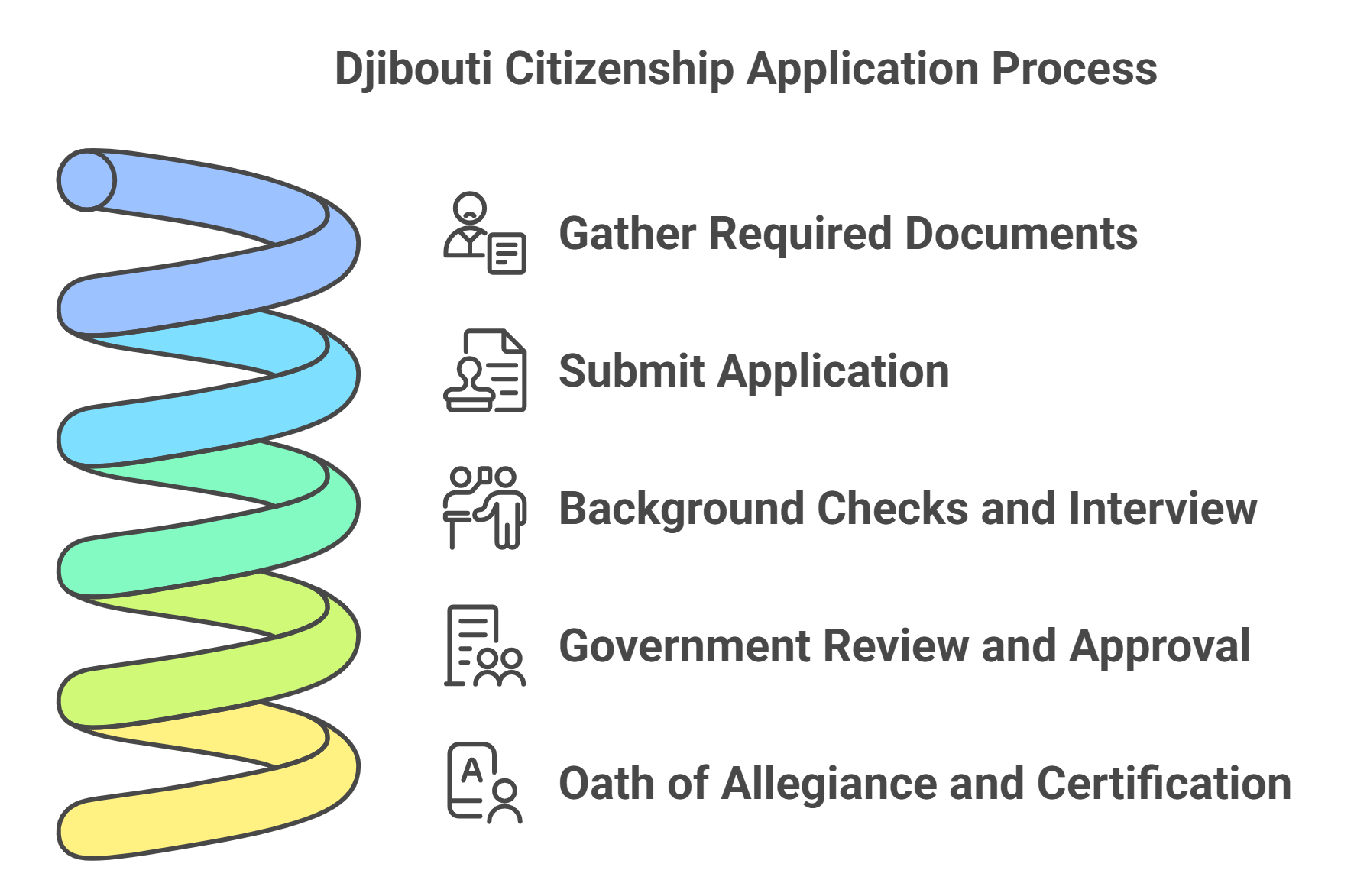
Djibouti, a small but strategically located country in the Horn of Africa, has a strict nationality law that regulates how foreign nationals can acquire citizenship. While Djibouti allows for citizenship by naturalization, the process is complex and requires meeting specific residency, legal, and cultural integration requirements. Djibouti grants citizenship by naturalization after residing legally for at least 10 years. Applicants must meet legal requirements. A Djibouti eVisa is required for entry and can be obtained online.
Djibouti’s nationality laws are governed by the Djiboutian Nationality Code (Code de la Nationalité Djiboutienne). Citizenship in Djibouti can be acquired in the following ways:
✅ By Birth (Jus Soli & Jus Sanguinis) – Citizenship is granted to children born in Djibouti to Djiboutian parents or, in some cases, to foreign parents under special conditions.
✅ By Descent – Children born abroad to at least one Djiboutian parent are eligible for citizenship.
✅ By Marriage – Foreign spouses of Djiboutian citizens may apply for citizenship after meeting residency requirements.
✅ By Naturalization – Foreign nationals who meet residency, integration, and legal requirements can apply for Djiboutian citizenship.

To be eligible for naturalization in Djibouti, a foreign national must meet the following criteria:
Applicants must have continuously resided in Djibouti for at least 10 years before applying. Residency must be legal, meaning the applicant holds a valid residence permit throughout this period. Periods spent in Djibouti without proper documentation do not count toward the residency requirement.
Applicants must have no serious criminal convictions (such as felonies, fraud, or national security offenses). A police clearance certificate (from both Djibouti and the applicant’s home country) is required to prove good moral standing.
The applicant must demonstrate financial self-sufficiency (employment, business ownership, or investment in Djibouti). Proof of regular income, tax payments, and financial stability may be required.
Knowledge of French or Arabic is essential, as they are Djibouti’s official languages. Understanding of Djiboutian culture, history, and laws is required, and applicants may have to pass an interview or test.
Djibouti allows dual citizenship in most cases, but some applicants may be asked to renounce their previous nationality, depending on their country of origin.

Note: Citizenship is granted at the discretion of the government, meaning even if all conditions are met, approval is not guaranteed.
Applying for Djibouti citizenship through naturalization requires meeting specific legal and administrative criteria. Applicants must provide various documents to demonstrate identity, residency, good conduct, financial stability, and integration into Djiboutian society. Below are the key requirements:
The process of applying for Djibouti citizenship by naturalization involves several steps. It is essential to follow these steps carefully to ensure a successful application.
Applicants must submit a detailed application package for the application of citizenship. This step ensures that all necessary information is provided to prove eligibility for naturalization.
The application must be submitted to Djibouti’s Ministry of Interior, Directorate of Nationality and Immigration. A processing fee (amount varies) must be paid upon submission.
Authorities conduct background checks to verify the applicant’s criminal record, financial stability, and overall integration. Applicants may be called for an interview to assess their understanding of Djiboutian culture, laws, and language.
The government makes a decision within several months to a year, depending on case complexity. If approved, the applicant takes an Oath of Allegiance to Djibouti. A Certificate of Naturalization is issued, allowing the applicant to obtain a Djibouti passport.

Becoming a Djiboutian citizen comes with several advantages:
Note: Djiboutian citizenship does not provide automatic rights to work in other East African Community (EAC) or African Union countries.
Djibouti generally allows dual citizenship, meaning applicants can retain their original citizenship while acquiring Djiboutian citizenship. However, it is crucial to verify the laws of the applicant’s home country, as some nations do not permit dual citizenship and may require renunciation of previous citizenship.
Rights and Responsibilities for Djibouti Citizens
As a Djiboutian citizen, individuals gain certain rights and responsibilities, including:
|
Rights:
|
Responsibilities:
|
While Djibouti offers naturalization as a path to citizenship, there are challenges:
If you are an investor or business owner, consider exploring investment visas or special residency permits, which may offer long-term stay options without requiring full citizenship.
If you do not qualify for Djiboutian citizenship by naturalization, consider these options:
🔹 Permanent Residence Permit – Available for long-term expatriates and investors.
🔹 Business or Investor Visa – Allows business ownership and extended stays.
🔹 Marriage to a Djiboutian Citizen – Can lead to easier residency and eventual citizenship.
Djibouti offers both citizenship and permanent residency, but they come with different rights, obligations, and eligibility requirements. Below is a breakdown of the key differences:
|
Factor |
Djibouti Citizenship |
Permanent Residency |
|
Legal Status |
Grants full Djiboutian nationality, including a passport. |
Allows a foreigner to live in Djibouti long-term but does not grant nationality. |
|
Eligibility Criteria |
Requires naturalization, long-term residence, marriage to a Djiboutian citizen, or a government decree. |
Typically granted to foreign investors, skilled workers, or expatriates meeting residency conditions. |
|
Duration & Renewal |
Permanent and does not require renewal. |
Must be renewed periodically, usually every few years. |
|
Rights & Privileges |
Full rights, including voting, running for office, and government benefits. |
No voting rights, no eligibility for public office, and limited access to government benefits. |
|
Travel Benefits |
Djiboutian passport allows visa-free or visa-on-arrival travel to several countries. |
Must travel using the passport of the applicant’s home country. |
|
Dual Citizenship |
Allowed, meaning naturalized citizens can retain their original nationality. |
No impact on an individual’s citizenship status. |
|
Process & Difficulty |
Requires legal residency for several years, a clean record, and government approval. |
Easier to obtain but requires meeting financial, employment, or business criteria. |
Djibouti citizenship can be revoked under certain legal circumstances, mainly for reasons related to national security, fraud, or voluntary renunciation. Here are the key reasons for revocation:
Djibouti’s citizenship by naturalization is a strict but attainable process for long-term residents who have integrated into Djiboutian society, maintained legal status, and contributed to the country. While the 10-year residency requirement makes it a long-term commitment, those who succeed gain legal rights, business opportunities, and access to government services.
If you are considering applying for Djiboutian citizenship, ensure you meet residency, language, and financial stability requirements. Consulting with legal experts or immigration officials can help navigate the complex application process.
Disclaimer: While this information was last updated in January 2026, we strongly suggest confirming all travel details with the appropriate governmental agencies, embassies, and airlines.
1
Step1: Complete the online application form with your personal details and passport information.
Step2: Proceed to securely pay online using your credit card.
Step3: Check your email for payment confirmation and receipt of your Djibouti eVisa, which will be sent electronically.
I'm want need passport